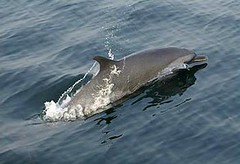
摘譯自2013年5月20日ENS印度,新德里報導;江惟真編譯;蔡麗伶審校<br />
印度環境及森林部最近公告:禁止全國各地以公眾娛樂目的海豚圈養行為。<br />
<br />
印度環境及森林部於17日發佈政令,通知各省政府駁回「任何以商業娛樂、公私營展示或任何形式的互動為目的」的申請案,適用對象包括「涉及進口或捕捉鯨豚行為之個人、多人、組織、政府機關或公私營企業」。<br />
<br />
此政令由印度中央動物園主管機關秘書長B.S. Bonal頒佈。Bonal認為鯨豚無法在圈養環境中適當生存,「圈禁改變了鯨豚的行為,造成鯨豚生活在極大壓力之下,嚴重影響其福祉和生存。」<br />
<br />
1972年的印度野生動物保護法中,國家級水生動物恆河豚和短鰭海豚被列為第一級保護動物,所有的鯨豚皆被列為第二級保護動物。環境及森林部表示,保護這些瀕危動物免於被圈禁和剝削是很重要的。<br />
<br />
環境及森林部說,「鯨豚非常聰明且敏感,許多研究海豚行為的科學家都指出牠們的智慧高得出奇。和其他動物比起來,海豚可以說是『非人類的人』,應保有牠們的權利,圈禁牠們做為娛樂用途在道德上是不能接受的。」<br />
<br />
 民間保育團體「印度動物保護組織」(Federation of Indian Animal Protection Organization,FIAPO)對此表示欣慰。FIAPO是印度主要倡導海豚動物福利的團體,常會見主管機關和遊說當地民間支持。<br />
民間保育團體「印度動物保護組織」(Federation of Indian Animal Protection Organization,FIAPO)對此表示欣慰。FIAPO是印度主要倡導海豚動物福利的團體,常會見主管機關和遊說當地民間支持。<br /><br />
FIAPO發言人Puja Mitra形容這個決定是「為海豚贏得的重大勝利!」「印度已經成為全球保護鯨豚免於被圈禁的指標國家,我們感謝Jayanthi Natarajan部長為全世界動物保護樹立里程碑。」<br />
<br />
FIAPO和生而自由基金會(Born Free Foundation)、全球綠色資助基金會(Global Green Grants Fund)、地球島嶼協會海豚計劃(Earth Island Institute’s Dolphin Project)和野生動物救援和復育中心(Wildlife Rescue and Rehabilitation)等組織合作,於去年開始倡議此禁令。<br />
<br />
前海豚訓練員Ric O'Barry,目前是美國地球島嶼協會海豚計劃的主持人,也盛讚印度的新政令。他表示,「這對海豚來說是一大勝利。印度政府不但為海豚發聲,也為人們對海豚的看法帶來正面的影響-海豚是會思考有感覺的動物,不該淪為賺錢的工具。」<br />
<br />
India Bans Captive Dolphin Shows as ‘Morally Unacceptable’<br />
NEW DELHI, India, May 20, 2013 (ENS)<br />
India's Ministry of Environment and Forests has decided to forbid the keeping of captive dolphins for public entertainment anywhere in the country.<br />
<br />
In a policy statement released Friday, the ministry advised state governments to reject any proposal to establish a dolphinarium "by any person / persons, organizations, government agencies, private or public enterprises that involves import, capture of cetacean species to establish for commercial entertainment, private or public exhibition and interaction purposes whatsoever."<br />
<br />
The statement issued by B.S. Bonal, the member secretary of the Central Zoo Authority of India, acknowledges that cetaceans in general do not survive well in captivity, saying, "Confinement in captivity can seriously compromise the welfare and survival of all types of cetaceans by altering their behaviour and causing extreme distress."<br />
<br />
Noting that India's national aquatic animal, the Ganges River dolphin, as well as the snubfin dolphin are listed in Schedule-I and all cetacean species are listed in Schedule II part I of the Wild Life (Protection) Act, 1972, the ministry said it is important to protect these endangered species from captivity and exploitation.<br />
<br />
"Whereas cetaceans in general are highly intelligent and sensitive, and various scientists who have researched dolphin behavior have suggested that the unusually high intelligence; as compared to other animals means that dolphin should be seen as 'non-human persons' and as such should have their own specific rights and is morally unacceptable to keep them captive for entertainment purpose," the ministry said.<br />
<br />
The grassroots Federation of Indian Animal Protection Organization, FIAPO, was pleased with the decision. This group took the lead in campaigning to ban dolphinaria in India, meeting with key ministry officials and garnering local grassroots support.<br />
<br />
FIAPO spokesperson Puja Mitra called the decision "a huge victory for the dolphins!"<br />
<br />
"India has become a beacon of hope for the global movement to protect cetaceans from captivity, and we thank Minister Jayanthi Natarajan for setting the benchmark in animal protection for the world," Mitra said.<br />
<br />
FIAPO has been working with their partners Born Free Foundation, Global Green Grants Fund, Earth Island Institute's Dolphin Project and Wildlife Rescue and Rehabilitation to bring about this prohibition in India for the past year.<br />
<br />
Ric O'Barry, a former dolphin trainer who now serves as director of the U.S.-based Earth Island Institute's Dolphin Project, applauded India's new policy.<br />
<br />
"This is a huge win for dolphins," said O'Barry. Not only has the Indian government spoken out against cruelty, they have contributed to an emerging and vital dialogue about the ways we think about dolphins – as thinking, feeling beings rather than pieces of property to make money off of."<br />
<br />
※ 全文及圖片詳見:ENS



